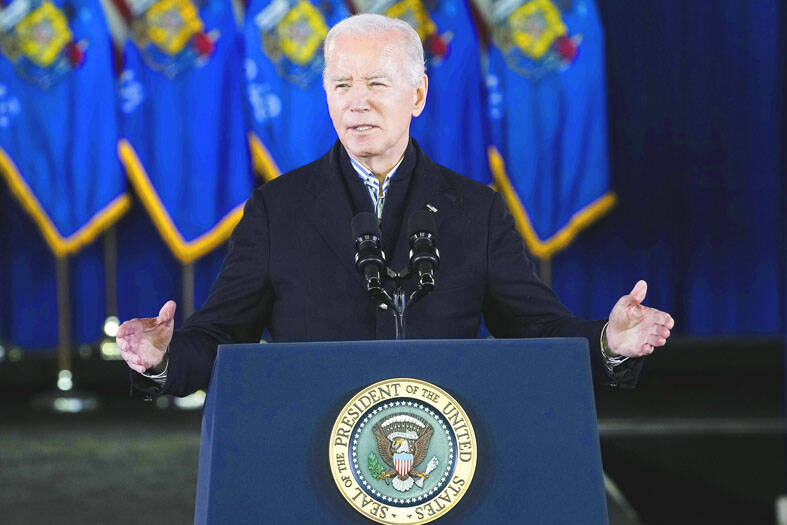US President Joe Biden on Friday signed into law the National Defense Authorization Act (NDAA) for Fiscal Year 2024, which requires the US secretary of defense to create a training program for Taiwan’s military, and requires a status report on the delivery of defensive weapons and services that the US has agreed to sell to Taipei.
Provisions in the NDAA related to Taiwan include measures to help boost its defense capabilities, counter Chinese influence campaigns and support Taiwan’s participation in international organizations.
One of those provisions requires the defense secretary, in consultation with “appropriate officials in Taiwan,” to establish a comprehensive training, advising and institutional capacity-building program for Taiwanese military forces, consistent with the US’ Taiwan Enhanced Resilience Act.

Photo: AP
The NDAA also directs the US secretaries of defense and state to describe actions taken to carry out the program in their annual report to the US Congress.
Other sections in the NDAA require US officials to closely monitor deliveries of defense articles to US allies, including Taiwan, and to prevent delays.
The bill forbids committing more than 85 percent of the funds available to the assistant secretary of the navy for research, development and acquisition until a plan is submitted to provide Harpoon missiles to security partners.
It also requires a briefing on the status of US-provided security assistance to Taiwan before the remaining funds can be released.
Taiwan has committed to purchasing 400 land-launched Harpoon missiles from the US. It hopes to start taking delivery of them in 2026 and to have received all 400 by the end of 2028.
The NDAA requires that the secretaries of defense and state brief congressional committees on the status of US-provided security assistance to Taiwan no later than 180 days after the date of the law’s enactment.
Those reports must include a list of defense articles and services either committed to or planned to be provided to Taiwan, and the estimated delivery schedule for each of them.
Crucially, the NDAA stipulates that the briefing must also identify any defense article or service whose delivery has been delayed by more than three months and the actions taken to prevent delays or accelerate the delivery of such items.
The NDAA also directs the defense secretary to work with Taiwanese officials on cybersecurity activities aimed at defending military networks, infrastructure and systems to counter “malicious cyber activity” aimed at military installations.
It also calls for officials to provide an assessment of the economic impact a potential Chinese invasion would have and response scenarios, along with viable economic policy options that would “cause escalating impacts” on China’s economy “during the pre-conflict phase.”
Officials are also required to provide regular assessments of Chinese efforts to convince Pacific island nations that diplomatically recognize Taiwan to change their allegiance to Beijing.

The Central Election Commission has amended election and recall regulations to require elected office candidates to provide proof that they have no Chinese citizenship, a Cabinet report said. The commission on Oct. 29 last year revised the Measures for the Permission of Family-based Residence, Long-term Residence and Settlement of People from the Mainland Area in the Taiwan Area (大陸地區人民在台灣地區依親居留長期居留或定居許可辦法), the Executive Yuan said in a report it submitted to the legislature for review. The revision requires Chinese citizens applying for permanent residency to submit notarial documents showing that they have lost their Chinese household record and have renounced — or have never

A magnitude 5.6 earthquake struck off the coast of Yilan County at 12:37pm today, with clear shaking felt across much of northern Taiwan. There were no immediate reports of damage. The epicenter of the quake was 16.9km east-southeast of Yilan County Hall offshore at a depth of 66.8km, Central Weather Administration (CWA) data showed. The maximum intensity registered at a 4 in Yilan County’s Nanao Township (南澳) on Taiwan’s seven-tier scale. Other parts of Yilan, as well as certain areas of Hualien County, Taipei, New Taipei City, Taoyuan, Hsinchu County, Taichung and Miaoli County, recorded intensities of 3. Residents of Yilan County and Taipei received

Taiwan has secured another breakthrough in fruit exports, with jujubes, dragon fruit and lychees approved for shipment to the EU, the Ministry of Agriculture said yesterday. The Animal and Plant Health Inspection Agency on Thursday received formal notification of the approval from the EU, the ministry said, adding that the decision was expected to expand Taiwanese fruit producers’ access to high-end European markets. Taiwan exported 126 tonnes of lychees last year, valued at US$1.48 million, with Japan accounting for 102 tonnes. Other export destinations included New Zealand, Hong Kong, the US and Australia, ministry data showed. Jujube exports totaled 103 tonnes, valued at

BIG SPENDERS: Foreign investors bought the most Taiwan equities since 2005, signaling confidence that an AI boom would continue to benefit chipmakers Taiwan Semiconductor Manufacturing Co’s (TSMC, 台積電) market capitalization swelled to US$2 trillion for the first time following a 4.25 percent rally in its American depositary receipts (ADR) overnight, putting the world’s biggest contract chipmaker sixth on the list of the world’s biggest companies by market capitalization, just behind Amazon.com Inc. The site CompaniesMarketcap.com ranked TSMC ahead of Saudi Aramco and Meta Platforms Inc. The Taiwanese company’s ADRs on Tuesday surged to US$385.75 on the New York Stock Exchange, as strong demand for artificial intelligence (AI) applications led to chip supply constraints and boost revenue growth to record-breaking levels. Each TSMC ADR represents